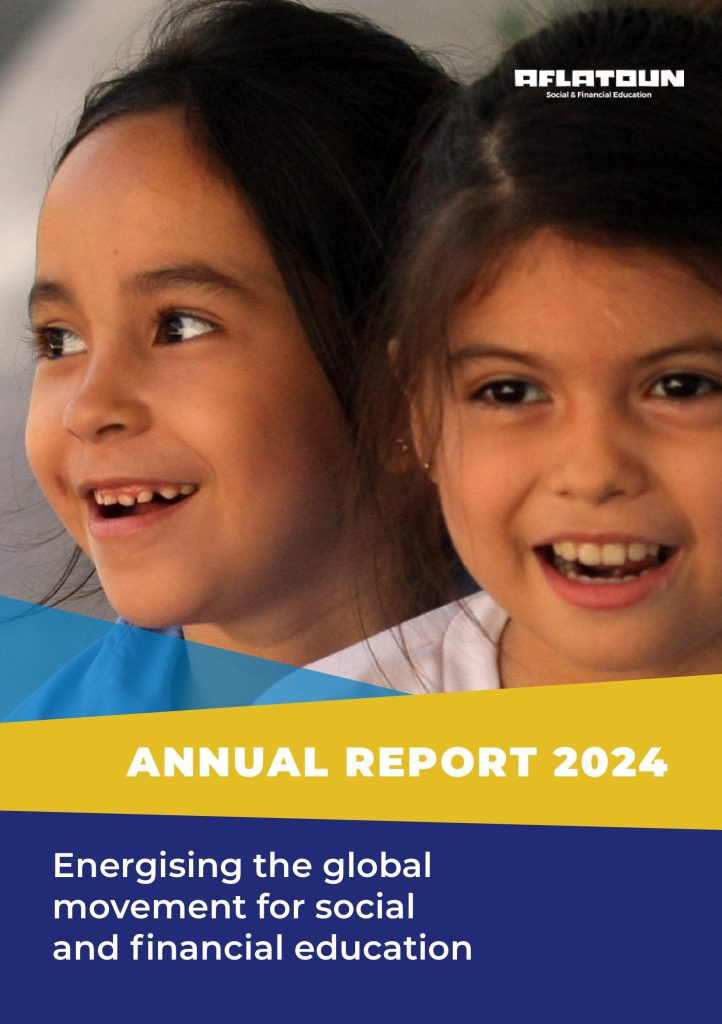Global Money Week, a Child & Youth Finance International (CYFI) initiative, is an annual financial awareness campaign built to inspire children and young people to learn about money matters, livelihoods and entrepreneurship. Global Money Week is a spin-off from Aflatoun Day, organized by Aflatoun International, as an annual celebration and learning event for all its national partners organized every year in March.
Celebrating Global Money Week and Aflatoun Day is more important than ever before. The latest international data show that the majority of children do not understand the basics about money. For example, the large majority of youth is not able to perform very simple calculations related to interest rates. Financial literacy challenges confront children and young people in developing economies and advanced economies alike.
Most education systems around the world do not consider financial literacy a priority. In many cultures it is expected that children learn about money from their parents or other family members. But most parents have never been educated about money themselves and have in many instances financial problems.
Research has shown that the earlier children learn about money, savings and investment, the better they manage their personal finances throughout their lives. These skills help children and youth to understand the difference between earning, saving and spending, making them better money managers, who are able to budget and have healthier money habits. It also helps children understand how to manage money at an early age and teaches them make better financial decisions regarding student loans, housing, first car, travel, and other expenses.
Starting early has also practical reasons. Nearly half of all children in developing countries do not complete their basic education and as a result will not get a degree which further decimates their potential for a profitable future. Most children will have dropped out of school by age 15. In order to reach these children at scale we need to catch them while they are still in the classroom. Hence, the focus will need to be on primary and lower secondary education.
Integrating financial education into the national curriculum should therefore be a priority for every country. Unfortunately, many ministries of education see financial education as a ‘nice to have’ while it is an essential 21st skill which children need to learn as soon as they can read and write – and before they drop out of school. Another more practical bottleneck to national integration of financial education is a reluctance out of fears of overloading the school curriculum and over-burdening the teachers by creating additional subjects. At Aflatoun we consider integration into existing subjects therefore as a viable option as it not only enriches the curriculum, but also helps reduce fragmentation and connects programmatic content across disciplinary boundaries. It also promotes teamwork among teachers from different disciplines, especially in secondary school education. Ultimately, financial literacy improves education relevance.
Every country will have to review their contexts to design a curriculum that includes financial literacy in a way that suits them best. Essential elements of any approach are very much in line with this years’ Global Money Week theme – Learn, Save. Earn. Learn to manage money wisely– Educating children and young people about their social and economic rights and responsibilities is key to creating a generation of capable adults, who can make wise decisions for their future. Save for their futures– It is important for children and youth to build clever savings habits from an early age in order to cultivate key money-managing skills for later in life. Earn for themselves and their families– Developing livelihoods skills or receiving entrepreneurial training, supports children and young people in getting a job or building their own business and developing their career.
At Aflatoun we believe that today’s children and youth should become empowered economic citizens, capable of understanding the importance of saving, and are equipped with the skills to be employed and create their own livelihoods. We want young people to learn to manage their money wisely. By empowering children and youth, we can help them transfer their knowledge to their families and to entire communities.
Global Money Week and Aflatoun day are therefore important opportunities where the whole world can celebrate and engage in these important topics in and outside the classroom.
About Aflatoun
Aflatoun was founded in 1991 through founder Jeroo Billimoria and by a group of creative children in India. These children were having a class on how to handle money and this initiative needed a name to represent their ideas. The children took up the challenge and decided on ‘Aflatoun’, the name of their favorite movie, and this is how Aflatoun was founded.












